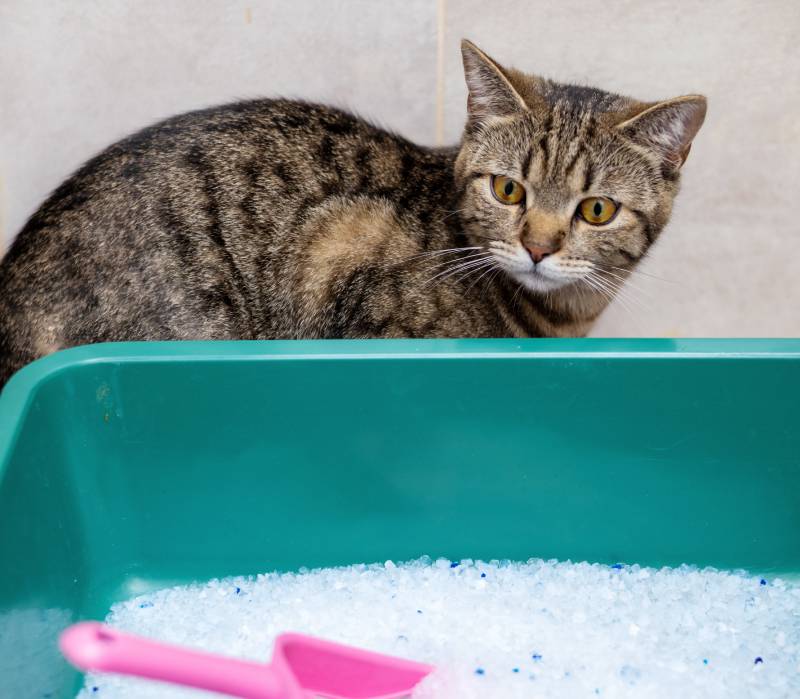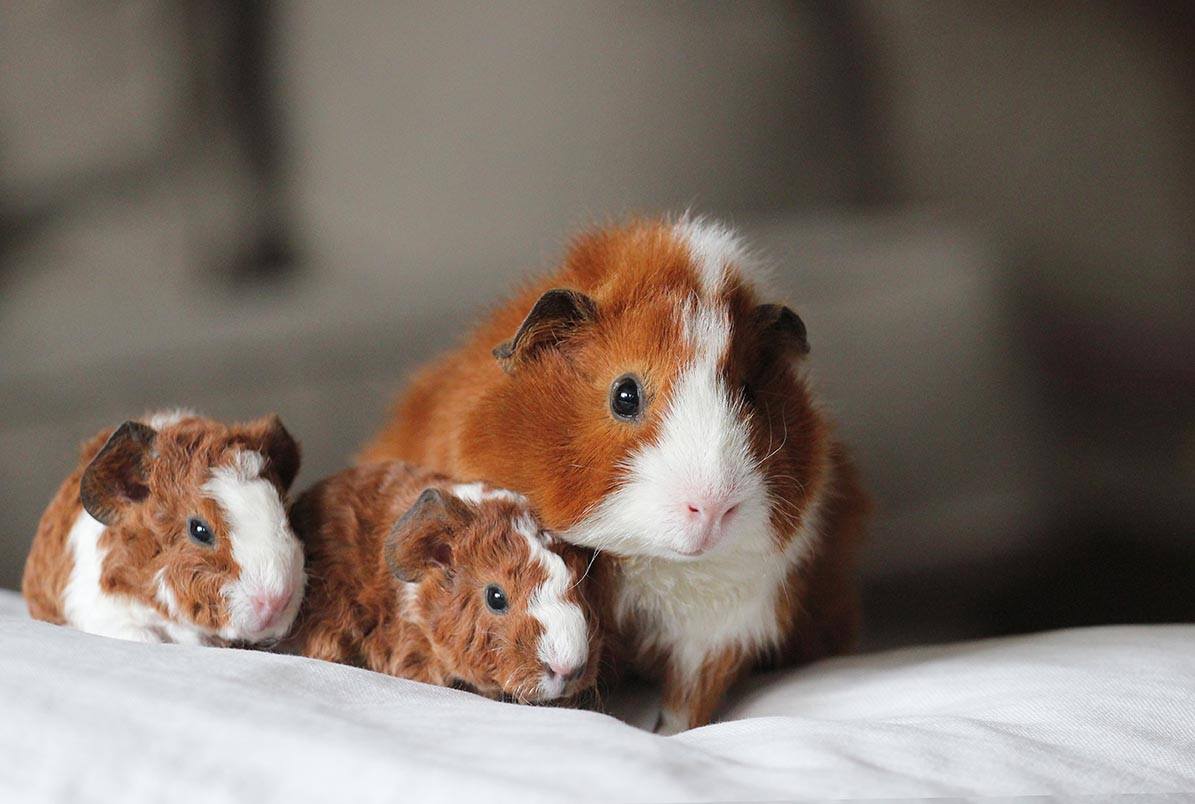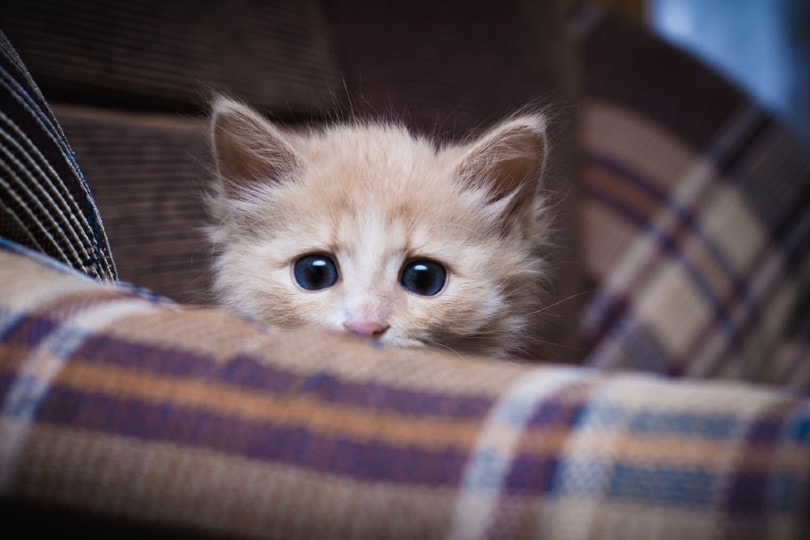VET APPROVED

The information is current and up-to-date in accordance with the latest veterinarian research.
Learn more »As cats become older, they may exhibit gradual changes in their behavior, some of which may be due to their age, while others are a sign of an underlying health issue. This can be anything from slowing down, resting and sleeping more, developing mobility issues, organ system disease, or litter tray problems. All of these will warrant a check-up with a veterinarian in order to find a way to manage any health conditions in the best possible way, ensuring a great quality of life for your aging kitty.
If you have an elderly cat, and you notice that they’re suddenly pooping on the floor, you’re probably wondering what’s happening. This article will discuss some of the most common reasons why your elderly cat may be pooping on the floor, from medical conditions, pain, stress, to changes in living circumstances, but a vet exam will always be necessary in order to rule out possible underlying health issues.

The 7 Vet-Reviewed Reasons an Elderly Cat May Suddenly Be Pooping on the Floor
1. Medical Issues
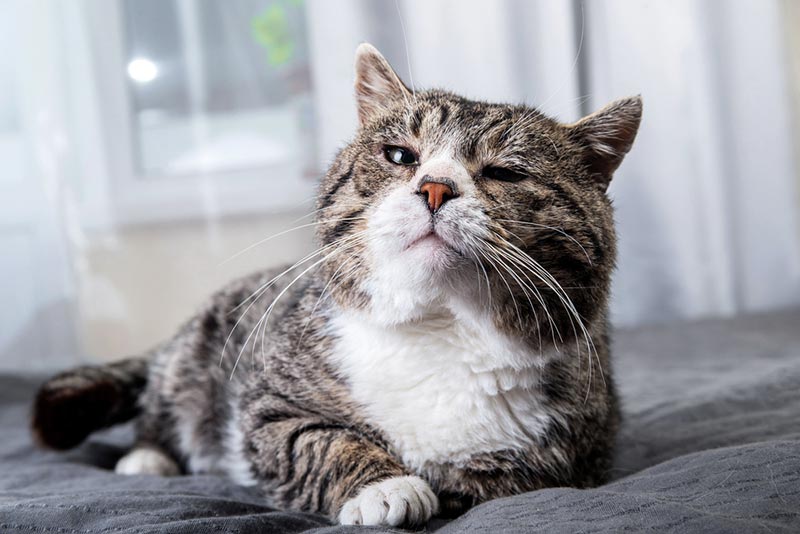
As cats age, they become prone to diseases and various health conditions and some of these may cause unintentional pooping outside of the litter box, which can result in your elderly feline pooping on the floor. Here are some of the most common health issues that lead to poop-related problems in cats:
- Arthritis and other mobility issues
- Dementia or feline cognitive dysfunction
- Gastrointestinal issues such as diarrhea or constipation
- Poor vision or blindness
- Thyroid problems
- Diabetes
- Kidney disease
Even when a cat isn’t sick but has painful or stiff joints due to arthritis, they can associate pain with the litter box, try to avoid that area, and may poop somewhere else. Similarly, if your feline has diarrhea, they might not make it to the litter box in time and instead poop somewhere else, including on your floor. They may also struggle to get into the litter box if the sides are too high and they are uncomfortable while walking.
Other health conditions, such as those that cause increased drinking and peeing, like diabetes or kidney disease, may cause the cat to poop outside of the litter box if it’s covered in excessive urine and not cleaned promptly.
Aging cats may suffer with a cognitive dysfunction, equivalent to human dementia, and may experience confusion, that also leads to inappropriate urination and defecation outside of their litter box. Signs of many of the above-mentioned health conditions are easily mistaken for dementia, and it’s important that a veterinarian rules out any of those underlying health issues before a presumed dementia is considered a likely explanation for pooping outside of the litter box.
If your elderly feline starts pooping outside of the litter box, you should take them to a vet. As there are various health-related conditions that can cause this poop problem, it’s essential to verify your cat is healthy, or if they are suffering from an underlying medical condition, to receive treatment as soon as possible.
A virtual veterinary exam can be greatly beneficial if you want more information on why this might be happening before packing up your senior cat and bringing it to an in-office veterinarian clinic.
2. Stress and Anxiety
Stress and anxiety are common triggers that can make an elderly cat poop and pee at any available spot they can find. There’s an array of things that could make your feline anxious, including:
- Changes in the household
- Moving
- New household members
- New pets
- Loud noises
- Renovations
- Fireworks
- Environmental changes
When stressed, a senior cat may urinate or poop in spots other than their litter box. However, unless there is a clear stressor, it can be difficult to distinguish stress from a medical cause, which is why a veterinary exam is crucial as a first step.
Typically, cats can adapt to the changes happening around them, they just need some time. Your elderly cat probably needs more time than younger cats to adjust to the new things in their environment. Because of that, try to be there for your feline and show support through this stage in their life.
However, if the pooping on the floor doesn’t resolve or is combined with other signs such as weight loss, poor appetite, sleeping more, gastrointestinal signs such as diarrhea or straining to defecate, or other, which indicates the cause is something else other than stress, you should take the cat to the vet. That way, they can exclude any medical causes behind this issue.
3. Dirty Litter Box
Cats like cleanliness, and they want their litter boxes clean. Suppose you have an elderly cat who is healthy but won’t use the litter box. Ensure that the litter box is not dirty. Remember that your feline has a strong sense of smell, and a dirty litter box, combined with the smell of feces and urine, will be repulsive to them.
Nobody likes when their toilet is dirty, and the same goes for cats. If a senior cat with a clean bill of health won’t go to the litter box and is pooping on the floor, it might be time to clean the litter box. You should make a daily routine and clean the litter box more frequently than usual. That will help your elderly cat to use the box again.
No matter what kind of litter you use, bad smells often linger. That's where an effective litter additive like Hepper's Advanced Bio-Enzyme Cat Litter Deodorizer can make a big difference.
- Bio Enzymatic Cat Litter Freshener - Smart formulation uses natural ingredients eliminating cat...
- Save Money - Stuff for cats isn’t the cheapest. With this litter box odor eliminator, you’ll...
- Every Litter, Every Surface - Are you afraid this additive won’t work on your litter? Fear not!...
This biodegradable deodorizer is fragrance-free and safe for all ages of cats and types of litter. It uses bio-enzymes to naturally get rid of odors and help your litter last longer.
At PangoVet, we've admired Hepper for many years, and decided to take a controlling ownership interest so that we could benefit from the outstanding designs of this cool company!
4. The Litterbox Is in a Hard-to-Reach Spot
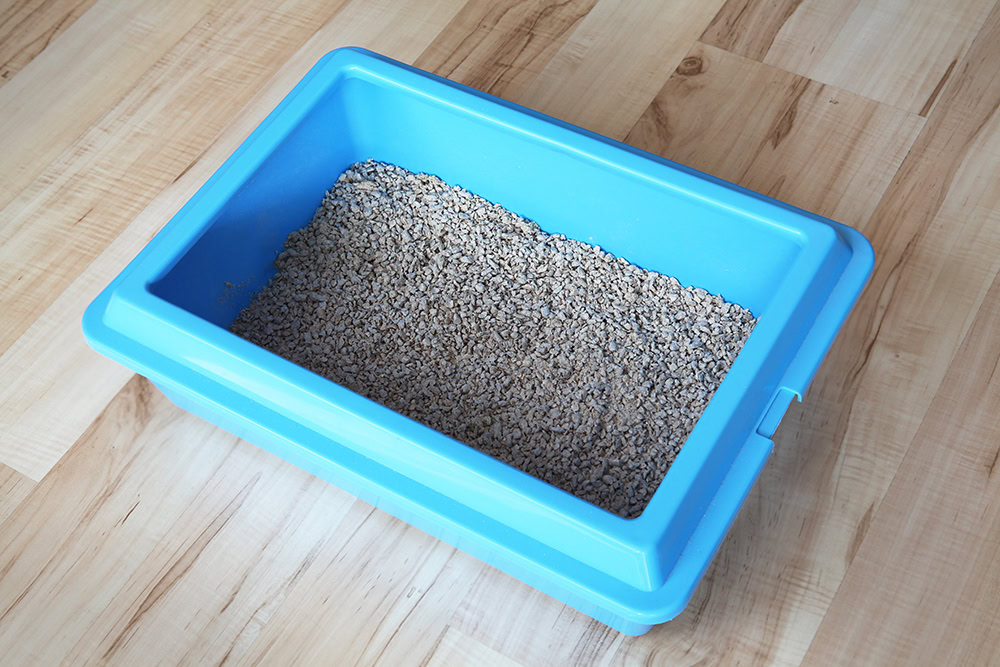
When a cat ages, they may suffer from arthritis which isn’t always that easily noticeable, making it painful to move, and daily things in the cat’s life may become too challenging. Your veterinarian can prescribe adequate pain killers to help your cat feel more comfortable, if arthritis is the cause of their mobility issues and reluctance to use the litter box. At this age, cats need a special kind of care and careful observation of their daily behavior, and as they’re typically less energetic and active, you may need to make adjustments in your household to help them.
Old cats may poop outside the litter box if the litter box is in a hard-to-reach spot. When a litter box becomes less accessible to your cat, they might not be able to reach the box. The same happens if the litter box sides are too high and difficult for your kitty to get into.
Firstly, it’s important to confirm with your vet that an underlying health issue or pain isn’t the cause of them missing the litter box. When they get a clean bill of health or pain killers in case of arthritis, make sure the litter box sides are low and easy to get into and move the litter box to an easy-to-access area. That way, your senior cat won’t have to struggle to reach it and will start using the litter box again.
5. Change in Litter
While cats find it important that their litter box is clean, they are also peculiar about another important thing—the litter inside the box. If you used to provide one litter to your elderly feline throughout most of their lifetime, but you suddenly stopped, your cat might start pooping on the floor.
Some cats like litter that has a sand or clay consistency, others prefer pellet form or paper, and if the new texture puts them off, they might poop elsewhere, including on the floor. Also, there are litters with scents that may smell nice to us, but they repel cats, which is why those products may not be suitable for all cats.
If you recently changed litter, try to look for a replacement similar to the old one. It’s best to look for a litter that your cat is used to and that will make your cat feel comfortable while peeing and pooping inside.
6. New Family Additions
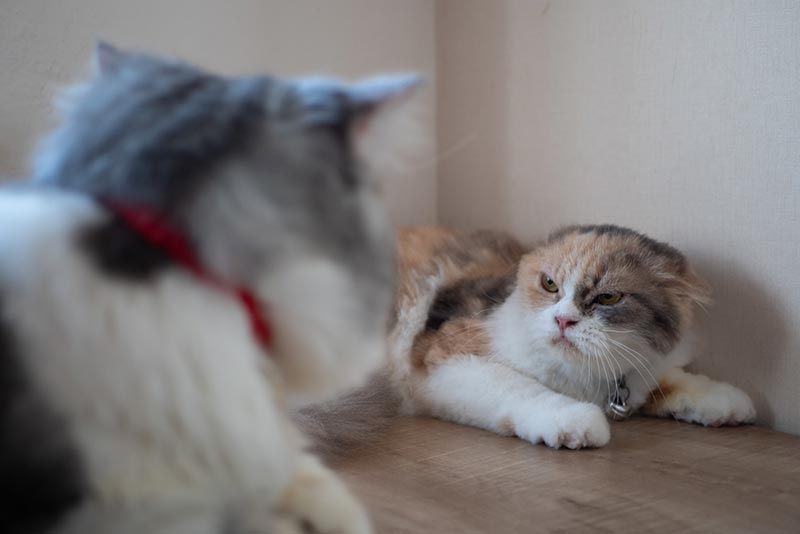
An elderly cat can stop using the litter box and poop on the floor instead if you have new additions to your family. This applies to anyone new entering your life and the life of your feline.
Changes such as having a new partner, a baby, or a new pet can lead to your senior cat pooping on the floor due to stress associated with this change.
Whenever introducing someone new to your senior cat, regardless of if it’s a person or an animal, you should do it gradually and create a positive and calm experience for both sides. In case of a new pet member, it’s important not to change your senior cat’s routine too much or too quickly, ensure there is no competition around resources with all pets having an adequate number of beds, toys, food and water bowls, and your senior cat still having a place where they can relax and rest without being disturbed. That way, you’ll allow your feline to accept the new pet with time and connect the positive experience with the new family member, allowing them to adapt faster and stop pooping on the floor, if that was the underlying cause. A cat’s personality will also influence how well they accept a new two or four-legged family member. Use of pheromone diffusers that provide reassurance and a sense of security through releasing happy and calming pheromones, is advisable when any new change in the household is anticipated well ahead of time.
7. Not Enough Litter Boxes
People who have multi-cat homes should have multiple litter boxes, especially when the cats are elderly. You should place them at multiple locations in your home as older cats might have other conditions that make it hard for them to reach the litter box. There’s a rule that every cat should have one litter box, plus an extra one in the home.
Because of that, the number of litter boxes you need increases per cat. Otherwise, you risk one or more of your cats pooping on the floor due to insufficient litter boxes they can use.
In this situation, you must purchase enough litter boxes for all your cats. Place each box apart from one another, in a quiet and safe location, and if you have a second floor, ensure there are litter boxes both downstairs and upstairs.

Quick Tips on How to Stop Your Cat from Pooping on the Floor
It can get frustrating when your cat is suddenly pooping on the floor, but you should remain calm and try to help your cat through this stage. It’s likely that this undesirable behavior is also uncomfortable for your elderly feline, but it’s something you need to resolve, as it may be a sign of an underlying health issue.
- Firsty, get them checked out by a vet, who can rule out any medical conditions responsible for them pooping outside of the litter box, and provide your kitty with pain killers and other medication to help them feel comfortable in their senior years.
- Ensure the litter box is easily accessible and the sides are not too high for your kitty to step over.
- Clean the area where the cat pooped as they may return there if there’s scent left on that spot.
- Clean the litter box frequently and thoroughly.
- Decrease stress triggers and make the environment comfortable and calm.
- Use pheromone diffusers well ahead of any anticipated stressors or changes.
- Tend to litter box issues—change litter when needed or adjust the location of the box.
- Introduce new family members and pets in a gradual and calm manner.
- Provide sufficient resources and number of litter boxes for each cat in the household.

Conclusion
Several different things, from medical conditions, pain to stress, and changes in their environment, can cause your elderly cat to poop on the floor. Observe your feline and find the source of this issue with the help of your veterinarian in order to get your cat to go back to using the litter box in a comfortable way. Remember that cats at this age need more time and reassurance to adapt, so be patient and allow the cat to follow their pace.
Featured Image Credit: Alexandra Morosanu, Shutterstock
Contents
- The 7 Vet-Reviewed Reasons an Elderly Cat May Suddenly Be Pooping on the Floor
- 1. Medical Issues
- 2. Stress and Anxiety
- 3. Dirty Litter Box
- 4. The Litterbox Is in a Hard-to-Reach Spot
- 5. Change in Litter
- 6. New Family Additions
- 7. Not Enough Litter Boxes
- Quick Tips on How to Stop Your Cat from Pooping on the Floor
- Conclusion
